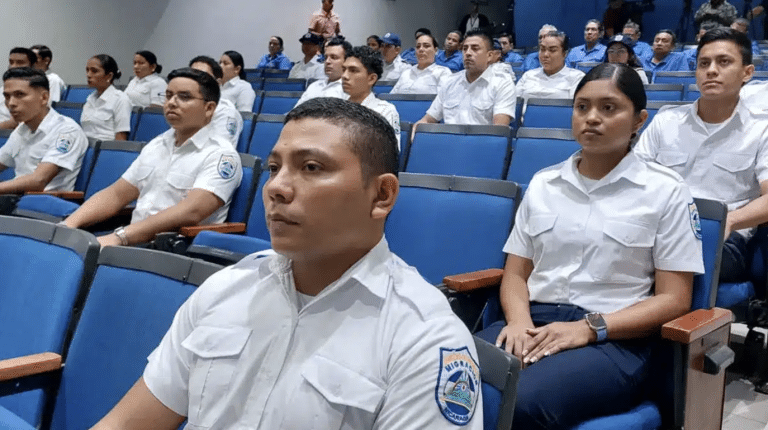3 de diciembre 2024

Children of Exile: The Births “Sowing Hope” in the Camp of Nicaraguan Farmers

PUBLICIDAD 1M
PUBLICIDAD 4D
PUBLICIDAD 5D
Immigration authorities may inspect hotels and lodging facilities “at any time and as many times as is necessary,” according to the reforms of Law 761

Reforms will allow the use of weapons by Immigration and Foreigner Affairs officers. Photo: Canal 4
Officials of Nicaragua's General Directorate of Migration and Foreigners (DGME) may carry and use firearms and other technical means of defense. This measure aims to “neutralize and put an end to any activity aimed at destroying or undermining the Constitutional order,” according to the reform of Law 761, the General Law of Migration and Foreigners, approved by the National Assembly on November 28.
Prior to these reforms, none of the articles of Law 761 mandated the use of firearms or “technical means of defense.” Article 221, which was annexed to the legislation, states that weapons shall be used “in compliance with the principles of rationality and proportionality, according to the situations and requirements.”
The reform details seven grounds for the use of firearms:
The authorization of the use of arms is in line with the “militarization” that the Daniel Ortega-Rosario Murillo dictatorship has carried out since December 2023, when it revived the Ministry of the Interior and turned it into a “superministry” composed of the Police, the DGME, the National Penitentiary System, the Fire Department, the General Administrative Directorate and consular offices.
In December 2023, the dictatorship also ordered that the then Ministry of Governance and its general directorates become part of the National Police.
The dictatorship also reformed Article 152 of Law 761 and established that businesses, organizations, labor or study centers are required to allow “immediate inspection,” “at any time,” and “as many times as is necessary” by the DGME to provide information on foreign workers employed by them.
Article 152 already allowed inspection for immigration purposes by the DGME, but did not establish the issue of “immediate” inspection, or that it could be “at any given time.” Information that must be provided on foreign workers includes full name, nationality, position, term of the contract, and domicile address, among other things.
Article 157, regarding registration of foreigners in hotels and similar types of businesses, was also amended. This article now says that all types and categories of lodging services “must keep a registry containing the general identification data of the guest, reservation and information on the entry and exit from the establishment.”
Prior to the amendment, Article 157 already mandated that “hotels, boarding houses or similar businesses, regardless of their category, that are located in the national territory, must keep a registry book of foreign persons,” but it did not detail what information needed to be included.
Ortega took advantage of the series of reforms to include an article that completely exempts the DGME from the payment of “national and municipal taxes in order to guarantee compliance with its goals and objectives.”
As detailed in Article 222, tax exemptions include sales tax on local purchases, as well as exoneration of taxes on imports, donations, inheritances, funding or subsidies from individuals or legal entities, or from national and international, public or private organizations, for the performance of its functions.
It even specifies that “donations made by third parties will be deductible from the donor's income tax.” The DGME will also pay a lower rate for water and electricity services.
DGME vehicles are also exempt from paying license plate fees, as well as annual registration and circulation fees. They will also have “the preferential right to circulate with the right of way on public roads.”
The reform package, which modifies 47 articles of the General Law of Migration and Foreigners and also includes an addition to the country's penal code, was approved within two days of being presented to the plenary of the National Assembly.
The reforms legalize expulsions, banishments, and refusals of entry or exit of Nicaraguans and foreign residents who represent a “social risk” or who may “undermine national sovereignty.”
Prohibiting the return of Nicaraguan citizens is a practice the Sandinista government has been carrying out in a discretionary manner in recent years.
The humanitarian NGO Nicaragua “Nunca Más” Collective has documented at least 111 cases of de facto statelessness of Nicaraguans. Among the most affected groups are clerics and laypeople, journalists, human rights defenders, businesspeople, feminists, musicians, and opposition politicians, according to the organization.
The 75-page reform bill also included an addition to Law 641 of the Penal Code, to establish prison sentences of two to six years for Nicaraguans who enter, leave or attempt to leave the country in an “irregular” manner with the alleged intention of “undermining national integrity, sovereignty” or who commit alleged acts “conspiring or inducing terrorist acts or economic and social destabilization of the country.”
**With information from EFE.**
This article was published in Spanish in Confidencial and translated by our staff. To get the most relevant news from our English coverage delivered straight to your inbox, subscribe to The Dispatch.
PUBLICIDAD 3M
Confidencial es un diario digital nicaragüense, de formato multimedia, fundado por Carlos F. Chamorro en junio de 1996. Inició como un semanario impreso y hoy es un medio de referencia regional con información, análisis, entrevistas, perfiles, reportajes e investigaciones sobre Nicaragua, informando desde el exilio por la persecución política de la dictadura de Daniel Ortega y Rosario Murillo.
PUBLICIDAD 3D